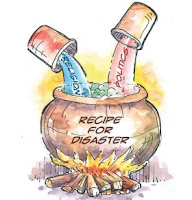 Tony Abbott wants his 3 daughters to preserve their virginity until they are married. Well, this is what he said in an interview with the "Women's Weekly" magazine, and the storm is brewing nicely in the tea cup. Some are in uproar, saying that Abbott should keep his opinions on women's sexuality to himself, and that his comments are just another example of his Catholic conservatism being inappropriately expressed in the public and political realm. Others are wondering what the fuss is all about. "What else would Tony Abbott want for his daughters?" they ask, challenging politicians from all parties and religious backgrounds to come clean on their own views, (which they assume are the same as or similar to his). This might free him up from the specific criticisms that are being leveled at him - but probably not...
Tony Abbott wants his 3 daughters to preserve their virginity until they are married. Well, this is what he said in an interview with the "Women's Weekly" magazine, and the storm is brewing nicely in the tea cup. Some are in uproar, saying that Abbott should keep his opinions on women's sexuality to himself, and that his comments are just another example of his Catholic conservatism being inappropriately expressed in the public and political realm. Others are wondering what the fuss is all about. "What else would Tony Abbott want for his daughters?" they ask, challenging politicians from all parties and religious backgrounds to come clean on their own views, (which they assume are the same as or similar to his). This might free him up from the specific criticisms that are being leveled at him - but probably not...I wonder had a non-religious politician had expressed the same views, would they have received the same criticisms or attention? (of course, it helps that he is the Opposition Leader)... But everyone knows that Tony Abbot is "religious" and "conservative" - he has these labels reapplied in the newspapers every time he opens his mouth. His view on virginity would be a common view expressed by religious people of many persuasions. The hope he expressed for his daughters would be a hope shared with many parent - both religious and non-religious. As an editorial in The Australian pointed out, "You don't have to be a Christian to believe that sex before marriage is wrong..." (but if you are a Christian, or religious, and you believe this, and God forbid, express it, then you'd better watch out)...
 One of the comments in The Australian today was interesting. In Lauren Wilson's article, "Making a Gift of Yourself", she refers to Julia Gillard's response to Abbott's comments. She writes, "Gillard declared Mr Abbott had 'confirmed the worst fears' about his conservative social views, virginity became shorthand for questioning his fitness to rule a liberal secular Australia."
One of the comments in The Australian today was interesting. In Lauren Wilson's article, "Making a Gift of Yourself", she refers to Julia Gillard's response to Abbott's comments. She writes, "Gillard declared Mr Abbott had 'confirmed the worst fears' about his conservative social views, virginity became shorthand for questioning his fitness to rule a liberal secular Australia."So, does having Christian views on personal behaviour exclude you from being able to carry out a political role in Australia? Can you have Christian views, but not express them? Is that okay? Can you have personal views on an issue, express them, but not push them in your political role? Is any of this possible and/or permissable?
We have two political leaders who have clearly and plainly identified themselves as Christian people. We'd better hope that it's okay for our leaders to be Christians and to be politicians or even Prime Ministers, because that is the choice we face in the election coming up later this year.
I wonder what Kevin Rudd thinks about the virginity of his daughter, or do I...? Rudd might be a bit smarter than Abbott, and he might keep this opinion to himself so as to avoid the criticism. It is a shame that he might feel he has to. Lucky for him that he had a Julia Gillard on his team. She was probably more than happy to respond on his behalf... :)
Shalom...







